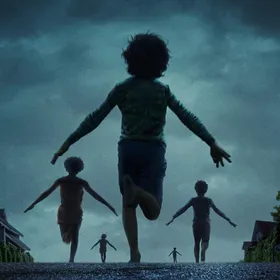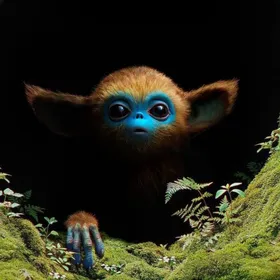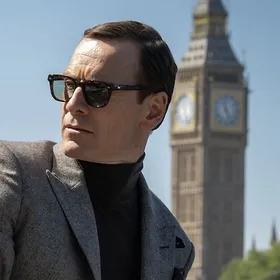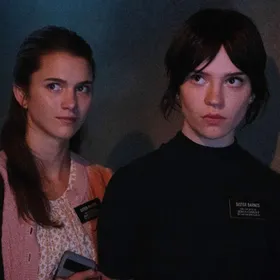
I loved Magnolia and There Will Be Blood back when they came out, but I have to admit that Paul Thomas Anderson’s films since then have left me a bit cold.
I’m happy to say that One Battle After Another entertained me more than Phantom Thread or Inherent Vice did. I saw it in IMAX and it was worth it for the close-up performance moments alone, especially by Sean Penn. His character is strange and twitchy and seems deformed somehow, and those quirks really come through when his face fills my entire field of vision.
There’s more action in this than PTA’s usual fare, including a brilliant car chase scene that features rolling desert hills. What starts off as a visual flourish—hypnotizing POV shots that follow the ups and downs of the road—becomes a tactic that a character uses against their pursuer. I would have cheered out loud if I were the type of person to do that.
What I’m struggling with, though, is the politics of the movie. The film depicts a conflict between characters from the extremes of the political spectrum. On one side is a terrorist group, committing violent crimes in the name of immigrant rights, and against the capitalist establishment. On the other side is a secretive, Santa-worshipping white supremacist club, whose members are in positions of high power and who do not shy away from an assassination or two. Both are shown as being ridiculous, and as far as I know, neither actually exist in real life. The US is a polarized country, and I feel like this movie gives fuel for both sides to say, “This is why they are to be feared.” The world of the movie feels just real enough that it filled me with dread about the future of American society. Which I guess was the point.
letterboxd link
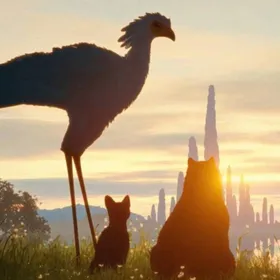
It’s refreshing to watch an animated movie that isn’t hyperkinetic and full of jibber-jabbering. Flow takes it completely in the other direction: it has no dialogue at all and contains many long unbroken takes with a gently floating virtual camera.
The story follows a cat who lives in a land with steadily rising water levels, and apparently abandoned by humanity. The sense of peril as the cat tries to flee from the flood really stressed me out, both because it evokes the threat of climate change, and because of the danger to the character herself. (I thought of the cat as female, but the film does not state this explicitly.) Eventually, she forms a found family with a group of other animals, including a dog and a lemur, and they set out on a mission to find safety.
I enjoyed watching the animals interact with each other. The filmmakers did a great job of balancing their natural animal behaviours with just enough anthropomorphized personality to make them distinct characters. I imagine it would be fun to watch this movie with a kid, because you could have great open-ended conversations about what each of the creatures is thinking or feeling; the movie doesn’t feed you that information, but rewards close observation and empathy.
Flow was produced using open-source software on a small budget. I’m not going to say that it looks as polished as a Pixar movie—there are some flaws in the rendering and character models—but the aesthetic is pleasant to look at, with a soft colour palette and lifelike animation. I think it’s a great lesson in embracing the limitations of your tools and making the best of them.
letterboxd link
This summer, I was doing my volunteer work on Fridays, and since I was out of the house anyway, I took any opportunity I could to catch some blockbusters on opening day. Most of these movies don’t invite much analysis, so this will be a really quick rundown of my thoughts.
Read more… 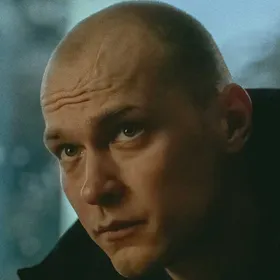
A movie that I admire and respect more than I enjoy. It’s always nice to see an independent film receive such high accolades, including the Best Picture Oscar of 2024. I really don’t have any criticisms with it, and I think cast and crew did a great job.
It’s more a case of the film not matching my vibe, or maybe vice versa, that I didn’t have the right energy to fully enjoy the viewing experience. The first act, wherein Ani and Vanya have a whirlwind romance, is like watching a series of the most fun parties you’ve ever been to. As an introvert, though, no matter how great a party is, I’m still going to want to leave.
Once the conflict kicks in, and the adults who oversee Vanya’s life threaten to break the couple apart, the movie becomes a frantic comedy of errors. Characters are almost always yelling at each other. It’s funny, in a Curb Your Enthusiasm kind of way, but unlike that show, it’s turned up to 11 for a pretty big chunk of the movie. Larry David at least knew how to mix up the rhythm so that not every scene is a shouting match.
The final chapter of the movie was my favourite: it slows down and gives us a few reflective one-on-one moments between Ani and Igor, one of the “thugs” sent to enforce Vanya’s parents’ wishes. I would have liked the film a lot less if it didn’t have this epilogue, which makes the characters—and we, the viewers—think about everything that just happened, and what it all meant.
letterboxd link
Sadly, this movie only impressed me on the superficial and technical level: the Carpathian scenery is gorgeous, and the practical special effects for bringing the ochi creatures to life are great. I don’t think A24 is big on merchandising1, but the toys would fly off the shelves.
Unfortunately, I had a hard time staying engaged because I found the story to be really thin. The main (human) character, Yuri, decides to help the baby ochi, in spite of her father’s hatred of them… but why? Her father later comes around, and supports her quest to return the baby to its family… but, again, why? The movie doesn’t really offer many answers beyond Well, look at the cute little guy!, and because of that, it feels quite empty.
letterboxd link
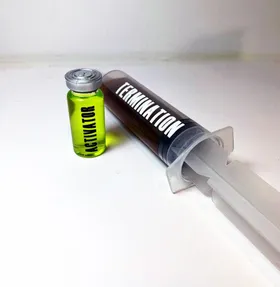
First, the positives: the visual design and rhythm of this film are full of energy, which makes it fun to watch. It goes really over the top with the gore—I watch everything with subtitles, and I’ve never seen the word squelching used as much as this film does when describing its sound effects—but then I found myself desensitizing to the squirmy discomfort, to the point where I was giggling gleefully at the gruesome moments by the end.
Unfortunately, I found the storytelling to be weak otherwise. The Substance in the film causes the main character Elisabeth (Demi Moore) to “birth” a second, younger version of herself named Sue (Margaret Qualley). The rules that come with the Substance state that they “are one,” and that they must switch every seven days.
After watching the film, I couldn’t help but brainstorm about the possible permutations of the idea. In essence, the movie could have explored the concept in three ways, each with differing psychological consequences on the characters.
Read more… 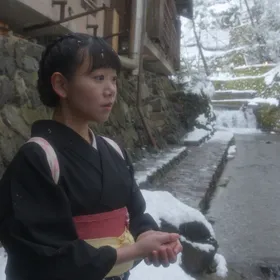
This Japanese comedy takes place in a spa/hotel in a small town, and follows the staff and guests as they get stuck in a mysterious time loop. A twist on the Groundhog Day formula, with a couple of key differences:
- the loop is only 2 minutes long, rather than the whole day, so we can see every iteration in its entirety, in real-time
- all of 10 or so characters are experiencing the same thing, which introduces an aspect of project management, as they assign tasks to each other and scramble to complete them within the 2 minutes
The first act is a lot of fun as the characters figure out what’s going on. Seeing how each person reacts is pretty funny… for example, one of the guests is a writer under pressure from his publishers, and he decides to use the time loop as a chance to rest, because it means that his deadlines will never come.
The movie surprised and impressed me with how it used its structure to illuminate emotional truths for some characters. For example, a young couple challenge themselves to escape from the others, by running away as far as they can. At first, it felt silly to me, since they know that they’ll always end up back where they started. But then I realized that the futility of the game was the point, and that it was a way for them to connect with each other, like a series of rapid-fire “dates.”
Along the way, the major characters wonder whether they caused the loop by wishing for time to stop. Everyone has a reason for fearing the future, and the natural response to this fear is wanting to just keep things as they are. The movie has a real “Monkey’s Paw” kind of message: there’s a fine line between staying in our comfort zones, and becoming stuck in a rut. We need time to move forward, even with all the scary uncertainty that progress brings.
letterboxd link
Who do I have more of a crush on, Michael Fassbender or Cate Blanchett? I think it’s a tie.
He’s a spy. She’s a spy. They’re married. There’s a mole in the spy agency. He has to find out who it is. It might be her. The other four suspects are conveniently also paired romantically. What are the HR policies like at spy agencies? Emotional attachments are a huge risk to national security. Relationship discord, an equally huge risk. Fassbender and Blanchett, their relationship: solid. The others, not so much. I’m all for workplace romances, but with far-reaching, world-changing stakes like these, I’m not so sure.
He wears cool glasses throughout. I changed my mind. I think he wins.
letterboxd link
I had a good time with this horror thriller, especially for the first two-thirds. The performances from the trio of lead actors are all impressive, and the characters’ respective stances on religion are all well-represented. On the downside, the villain’s plot suffers from being overly convoluted—it’s a long walk just to make a philosophical point.
There’s a point that I want to think through, which will require spoilers, so stop reading if you don’t want to know.
Read more… 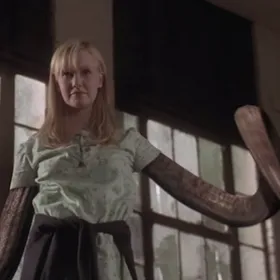
I have fond memories of going to see this when it came out in theatres in 1998. Watching it now, I think I can see why… back then, I would have thought it was the coolest thing, when they introduce characters with a freeze-frame showing their name on the screen. And the scene where our main characters walk as a group in slow motion and glare smolderingly at all of the other students who have been taken over by aliens… so cool.
The way this film depicts high school students was exactly my image of what it meant to be cool when I was that age: be angry and swear all the time, and talk to teachers with no respect! And fighting off an alien invasion was exactly the kind of thing that I fantasized about as a kid.
How does it hold up? I think it’s still entertaining. And I couldn’t believe who was in the cast… Jon Stewart? Salma Hayek, who appears in only a couple of scenes? Daniel von Bargen, a.k.a. Mr. Kruger of Kruger Industrial Smoothing on Seinfeld?
letterboxd link


